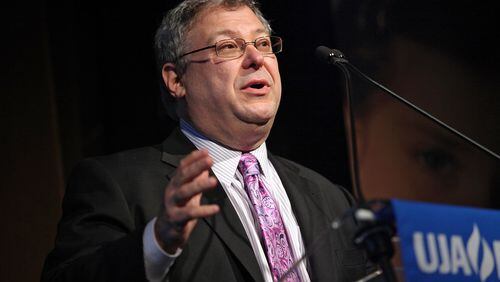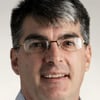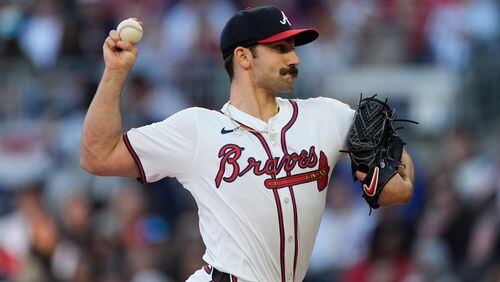Steve Koonin, who was announced as a co-owner and CEO of the Hawks late Sunday night, sat down with the Atlanta Journal-Constitution Monday for an interview. The 56-year-old life-time Atlantan talked about why he is leaving Turner Entertainment Networks and what will be his biggest challenge with the franchise.
Koonin said he turned down several “fabulous jobs” in New York and Los Angeles before deciding to join the Hawks.
Koonin met with Hawks and Philips Arena employees Monday. He plans to start his position later in the spring.
Q. Why this big move?
A. There is some symmetry to my life. I was 14 years at Coke and 14 years at Turner. And, realistically looking, I wanted to stay in Atlanta. It was very important to me. I wanted to do something new. I wanted to do something that was a challenge and I wanted to do something that is in the community. I'm on the board of several organizations and I believe that if this is done right, that sports can lift the tide of a community. They can help build the brand. They can build the identity. They can attract people and businesses. So, this was part community based and part passion based.
I love the Hawks. I remember when the moved here from St. Louis in ’68. I thought Pete Maravich, I still do, is the best basketball player that I’ve ever seen. I remember Sweet Lou Hudson in the (70’s). This was the place to be. We would be here on Saturday night and see our friends. It was for young Atlanta, this was the social scene. I’m desirous and hopeful that we can create that optimism again and bring that back.
This is a very good building and a very good town. I’m so impressed with (general manager) Danny Ferry. I think he is the real thing. I’m incredibly impressed with (co-owner) Bruce (Levenson). They needed somebody to be accountable to the fan and I’m more than willing to be accountable to the fan. I also want a participation. We can’t do it if people aren’t going to try us and invest in us and buy in. I’ve sold like seven season tickets already in my first 17 hours. My folks bought two. I’m optimistic that we can make this something special and I want to be part of it.
Q. I have the impression that the Hawks were looking for a face of the organization. Would that be correct?
A. Yes. There has to be an accountability. When Ted Turner was sitting in the Braves box swinging a foam tomahawk, there were as many eyes on him as there were on the field because he was accountable. Whether the team won or lost, you knew where the buck starts. Today in modern sports world, there are 15 owners, there are investors and it's very hard for the fan to understand who do I yell and scream about? Who do I high-five? Who do I want to write my check to? As an Atlanta native, it's something that I want to be. Bruce and the ownership group and I really spent a lot of time and I really buy into Bruce Levenson's vision and him as a person. I am going to be the accountable party. Literally, my contract calls me 'The Face.'
Q. What do you initially see as the biggest obstacle?
A. I think there has to be an assessment. I want to listen to a lot of people. … In television, there is an expertise in making a good TV show. You might have a good idea for a show about a crooked detective. But to get that onto the screen takes a huge amount of technical skill. Being a fan and creating an experience is something we can all understand as a person. So I want to ask a lot of questions. I want to listen. I want to think about it differently than just linear research. I believe that we have a very good product and I'm excited that they made the playoffs against all obstacles. I also believe we have to focus. This is a very young city. And the NBA is on fire with the group of people called millennials. They consume it through video games. They consume it through still playing. They consume it through television. I know the TV ratings pretty well. We need to bring them into the arena for the live experience because it's a great experience. I want to listen. I want to access. I want to build a strategy and a plan. I want to get the right people in the right places and working really, really hard to move forward. It's not a one-year thing. It's not a one-night thing. It's on-going. It's consistent.
Q. Being from Atlanta, you know the ownership is a black eye to a certain segment of the community. How do you see getting over that?
A. I see that as the past. I also see that as a fan that was a disappointing period. It doesn't reflect on the future. I see Danny Ferry, who is a legendary player, brilliant guy, really understands the business of basketball and how to bring in talent. We want to build an environment here where this city can capitalize on the desire of athletes, of entertainers, who want to live here and stay and play here. The way we are going to do that is to fill the arena, create a winning enterprise. It's going to take some time but we are going to put the pieces and the talent together.
I call it the shot-gun marriage of the ownership group was all great with intentions but you had a lot of very successful people all looking at a different venture. There was some chaos. But it resolved itself. Bruce Levenson in the majority owner and he is brilliant and terrific and that is the past. If people want to deal in the past, we couldn’t convert them no matter what we do. But I’m the future. Danny is the future. Bruce is the future.
Q. How will you use the NBA's television ratings in Atlanta, which are very good, to help?
A. I think that it can translate. Again, we have to do a better job of promoting it. We've got to do a better job presenting it. We've got to do a better job of making it. I'm proud that 'Inside the NBA' has very little to do with the NBA. It's a very entertaining show. It has very little to do with the X's and O's of the NBA. I think we have to understand sports as entertainment. If we want to talk about the low-post block outs, we might block out a few viewers. We are going to work with Fox Sports. We are going to make it more fun and something that is more enjoyable. That's what we did with the NBA. It's worked pretty well.







